THE PRODUCTS OF OUR LAND,
CREATED BY NATURE
PARMIGIANO-REGGIANO CHEESE
The King of Cheese
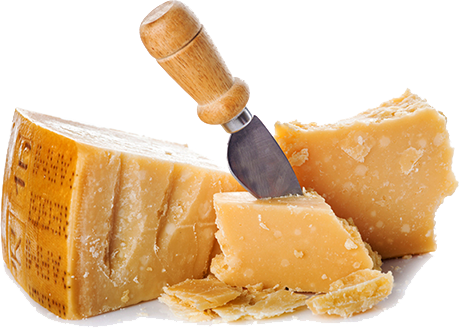
Parmigiano-Reggiano cheese goes back to Benedictine and Cistercian tradition as far as the cheese making is concerned. During the Middle Ages, the monks elaborated a process to make a cheese that could last long, using the local products available, such as the salt of Salsomaggiore and the milk of the cows bred in the monasteries. The result was a dry cheese, preserved in large wheels shapes. Around 1250, we have the first mention of this cheese in a sale notary act. The “Caesus Parmensis”, the cheese of Parma, was already known in the North of Italy. After a century, the cheese reached the major ports of Italy to be sold in the known lands.
The method of production hasn’t been changing during the centuries. Today, as in the Middle Ages, the receipt is still the same, natural ingredients and no additives.
At the beginning of 1900, two innovations were introduced: the use of fermented whey and the use of steam heating to enhance the quality.
In 1934, the towns of Parma, Reggio Emilia, Modena e Mantua established a consortium to protect the its real origin. This extraordinary cheese is exclusively produced here. Nowhere else in the world.
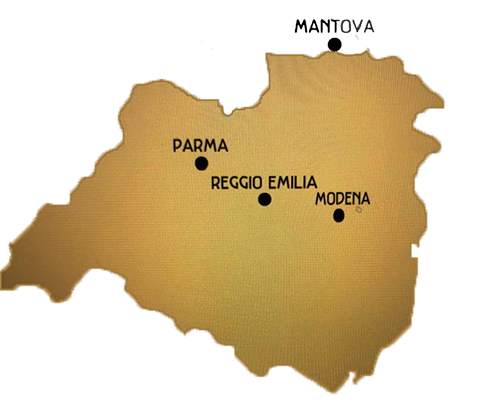
This is the area hosting the farms where the cattle are fed on locally grown forage. The feeding of cattle complies with the norms of a strict specification that bans the use of silage, fermented feeds and animal flour.
OUR SELECTION OF PARMIGIANO-REGGIANO DOP AND IGP
12/18/24/30/34 Months matured and traceable to the origin.
Our Parmigiano- Reggiano is one of the best quality you can find in the DOP area.
It comes vacuum packaged to keep the quality intact
PARMA HAM
Excellence in a crown
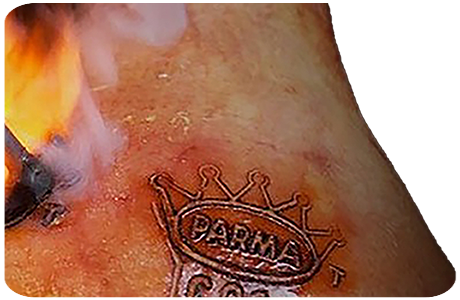
Parma ham has been known since Roman times. Parma area’s unique weather conditions allow to produce this over the top quality ham so appreciated by gourmets for centuries. The word ‘Prosciutto’ originates from Latin ‘perexsuctum’ which means ‘dried’ – so to indicate the perfect conditions of its production.
We found the first mention of Prosciutto at the times of the Romans, by a essential description the production method: pork legs were left to dry, greased with a little oil and could age without decay. The result was a tasty meat which could be have been preserved for a long time while maintaining intact its flavor and quality .
Since then, we added nothing to the method. Nature and climate of Parma area are still doing this extraordinary job.
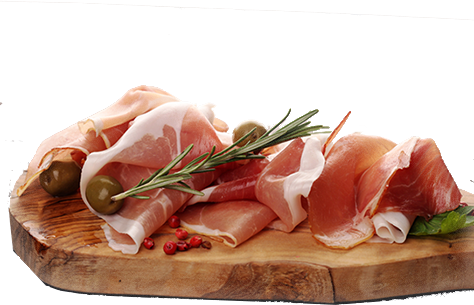
Our selection of Parma Ham DOP and IGP:
20/24/30 Months cured and traceable to the origin.
Our Parma Ham is one of the best quality you can find in the DOP area.
Our Parma Ham is vacuum packaged to keep the quality intact
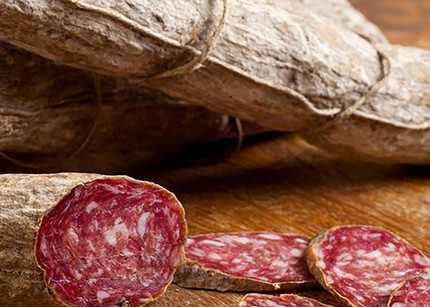
OUR SELECTION OF CURED CHARCUTERIE DOP AND IGP
Together with Parma ham, a remarkable charcuterie tradition has developed in the surrounding area, and today we can taste excellent charcuterie products:
Salami
Coppa
Culatello
Culatta
EXTRA VIRGIN OLIVE OIL
Sunshine in a bottle

Probably the most widely-used oil in cooking, olive oil is cold pressed from fresh olives. It’s mainly made in the Mediterranean, primarily in Italy. Much like wine-making, climate, soil and the way the olives are harvested and pressed all have an impact on an oil’s character.
Olive oil is assessed on three criteria: fruitiness, bitterness and pepperiness. The flavor, smell and color can vary radically, both according to its origin, as well as whether it’s extra virgin (the finest grade) or not.
Generally speaking, the hotter the country, the more robust the flavour of the oil.
Extra virgin oil is the most expensive type, and is made from the first cold pressing of the olives. It has a very low acidity rate (under 1%) and is best used for dipping or to dress salads, both because its superior flavor is impaired by heat and because it has a low smoking point.
Virgin olive oil is also a first pressing, but has a slightly higher acidity level (under 2%). It should be used in much the same way as extra virgin, and can also be used to cook Mediterranean dishes to create an authentic flavor.
The flavor of Italian oils varies from region to region. The north produces oils that are mild, slightly nutty, and very good with fish. Oils from the center of the country are stronger-tasting, with grassy notes. Southern Italy, including Sicily, produces oils that have a drier, more herbal flavor
OUR SELECTION OF ITALIAN EXTRA VIRGIN
OLIVE OIL DOP AND IGP
LIGURIA OIL
TUSCANY OIL
TUSCIA OIL (the best olive oil quality ever)
PUGLIA OIL
TUSCANY OIL
TUSCIA OIL (the best olive oil quality ever)
PUGLIA OIL
FLAVOURED EXTRA VIRGIN OLIVE OIL
THE TASTIER COOKING EFFECT
A wide variety of flavored extra virgin olive oils, for salad, rice, pasta dressing is also available:
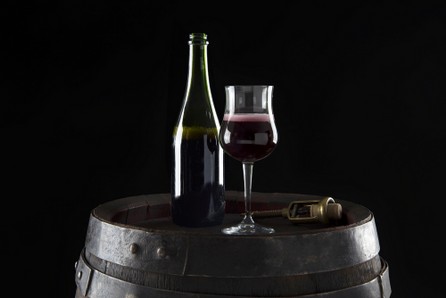
- Black Truffle flavor
- White Truffle flavor
- Chili flavor
- Porcini mushroom flavor
WINES OF OUR LAND
Fall into the spirit

OUR SELECTION OF WINES DOP AND IGP
MALVASIA WHITE AND MALVASIA ROSE’
Undoubtedly, this is the best and most important wine of Colli di Parma DOC made from Malvasia di Candia Aromatica grapes (85-100%) with the permitted addition of Moscato Bianco grapes (0-15%), thus having the same grape composition as the non-barrel aged Colli di Parma Malvasia DOC.
Malvasia DOC has a more or less intense straw yellow color, an appealing, aromatic and characteristic scent. Although the taste ranges from dry to sweet, the wine is always balanced.
A light sparkling Frizzante and a sparkling Spumante type is also available. The latter is either produced through the Metodo Classico or through the Charmat method. The characteristics of the Spumante type are the same as for the other types, except that it, of course, has fine, attractive foam and persistent bubbles.
The dry Colli di Parma Malvasia Riserva DOC is best served with fish or as an aperitif, while the sweet one is a great accompaniment of desserts.
The minimum mandatory aging period is 12 months, of which 3 months in the bottle.
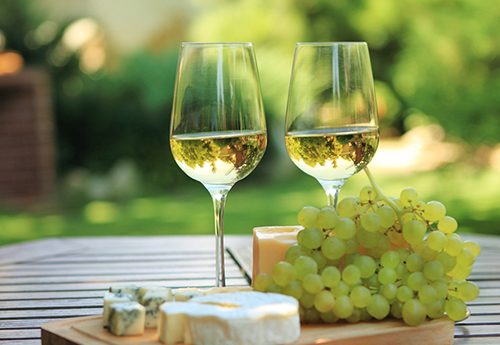
LAMBRUSCO
This sparkling red wine is made from Lambrusco Maestri grapes (85-100%), with the permitted addition of other local, non-aromatic, certified grapes (0-15%).
Colli di Parma Parma Lambrusco DOC is a more or less intense ruby red wine with an equally intense and appealing bouquet, and a dry, soft taste.
The wine is a good accompaniment of most meals.
BONARDA
This red wine has the same composition as the non-barrel aged Bonarda DOC, namely Bonarda grapes (85-100%), with the permitted addition of other non-aromatic, certified grapes from the zone (0-15%), except for the Lambrusco type of grapes.
Bonarda DOC has a more or less intense ruby red color and an inviting, fruity and characteristic scent. The taste ranges from dry to sweet.
The sweet type is best served with dessert, while the dry type can be enjoyed throughout the meal.
The minimum mandatory aging period is 24 months, of which 6 months in the bottle.
FORTANA
Fortana is a dark-skinned variety native to Parma area. Its name roughly translates to "strong" or "tough one" and is thought to be a reference to the grape's hardiness in – or even preference for – tough clay soils, near the rivers. Fortana is sometimes colloquially called Fortanina. Flavors of red berries are most common in Fortana wine.
GOURMET COOCKING HAS NEVER BEEN SO SIMPLE

SAUCES FOR COOKING
Italian gourmet cooking has never been so simple
Sauces play an important role in maximising flavours, adding juiciness and improving the mouth feel of a dish. They can be added to flavor pasta, pizza, used as filling for sandwiches or added to any recipe.
Sundried tomatoes sauce
4 cheese sauce
Hot sauce
Harissa hot sauce
Bell pepper sauce
Artichokes sauce
Porcini mushrooms and truffle sauce







